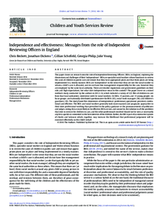Abstract
This paper draws on research into the role of Independent Reviewing Officers (IROs) in England, exploring the dimensions and challenges of their ‘independence’. IROs are specialist social workers whose function is to review the cases of children in public care and ensure that they have appropriate plans and that these plans are being implemented in a timely manner. IROs are ‘independent’ in the sense that they are not the social worker to whom a child's case is allocated, and do not have line management responsibility for the case, however they are employed by the same local authority. There are detailed regulations and government guidelines on their role, and high expectations, but what does independence mean in this context? The paper draws on a mixed methods study conducted by the authors in 2012–14, which included a survey of 122 files of children in care from four local authorities; interviews with 54 social workers, 54 IROs, 15 parents, and 15 young people; six focus groups; and nationally-distributed questionnaires for IROs (65), social work managers (46) and children's guardians (39). The study found five dimensions of independence: professional, operational, perceived, institutional and effective. The IROs and social workers generally took more nuanced and pragmatic approaches to their inter-professional working than prescribed in the policy guidance or the pronouncements of politicians and judges, seeing this as more likely to be effective. IROs are not, and cannot be, the solution to all the problems that exist in services for children in care, and the other professionals involved should not be seen as necessarily any less capable or committed to the best interests of the children. Rather, the IRO is part of an interactive system of checks and balances which, together, may increase the likelihood that professional judgement will be exercised effectively on the child's behalf.

